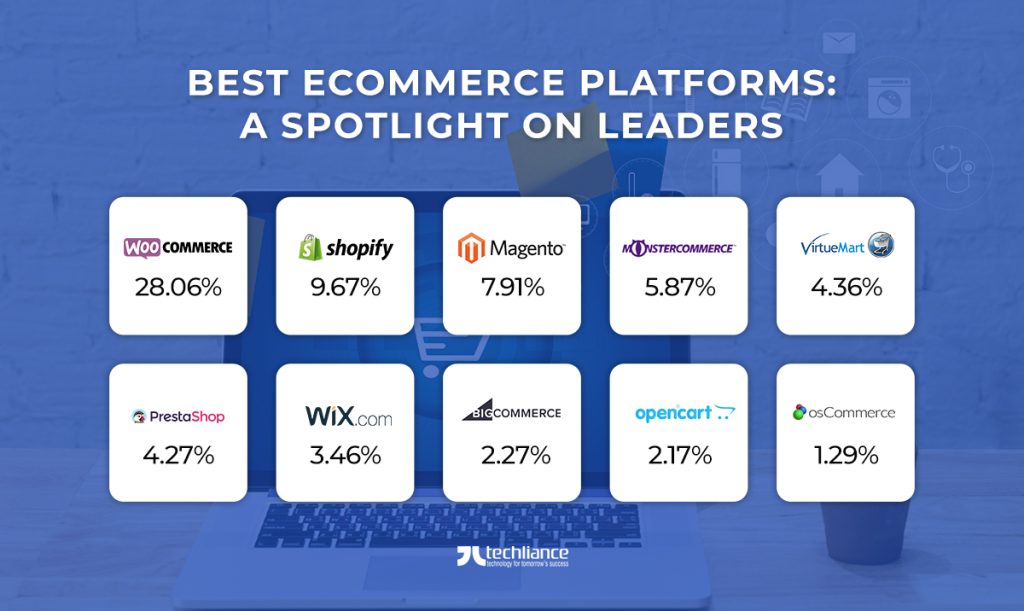Starting an online store has never been easier, thanks to the wide range of e-commerce platforms available today. For small businesses, choosing the right platform can be a game-changer, influencing everything from user experience to sales and growth potential. But with so many options on the market, it can be overwhelming to decide which platform is best suited for your needs. This article will explore some of the best e-commerce platforms for small businesses, covering their features, pros, and cons to help you make an informed decision.
1. Shopify: The All-in-One Solution
Shopify is one of the most popular e-commerce platforms, trusted by businesses of all sizes, especially small businesses. It offers an all-in-one solution for building, running, and growing an online store. Shopify handles everything from product listing to payment processing, marketing, and even hosting.
Key Features:
-
User-Friendly Interface: No need for technical expertise—Shopify provides a simple drag-and-drop interface that makes building your store easy.
-
Customizable Templates: Shopify offers a variety of professional, mobile-responsive themes, which are fully customizable to match your brand’s look and feel.
-
Integrated Payment Solutions: Shopify Payments makes it simple to accept payments without needing third-party gateways, though it also supports popular options like PayPal and Stripe.
-
App Integrations: With access to a large app marketplace, you can easily enhance your store’s functionality, from inventory management to email marketing.
Pros:
-
Easy to use, even for beginners.
-
Great customer support (24/7).
-
Excellent scalability—grows with your business.
-
Secure and reliable payment system.
Cons:
-
Monthly fees, starting at $29/month.
-
Transaction fees if you use third-party payment gateways.
-
Can get expensive if you need many apps or advanced features.
2. WooCommerce: The WordPress E-commerce Plugin
If you already have a WordPress website, WooCommerce is an excellent choice for turning your site into a full-fledged online store. As a plugin, WooCommerce integrates seamlessly with your existing WordPress site, allowing you to add e-commerce functionality without needing a separate platform.
Key Features:
-
Highly Customizable: WooCommerce is open-source, which means you can adjust it to fit your needs exactly. You can modify both the front-end and back-end of your store.
-
Flexible Payment Options: WooCommerce supports multiple payment gateways, including PayPal, Stripe, and direct bank transfers.
-
Large Plugin Library: Extend your store’s functionality with plugins for SEO, marketing, analytics, and more.
-
SEO-Friendly: Since it’s built on WordPress, WooCommerce benefits from WordPress’s built-in SEO tools, helping your store rank better in search engines.
Pros:
-
Low-cost solution, especially if you already have a WordPress site.
-
Highly customizable, allowing you to tailor the store to your brand.
-
No transaction fees unless you use a payment gateway.
-
Large community support and extensive documentation.
Cons:
-
Requires some technical knowledge to set up and maintain.
-
You need to pay for hosting, SSL certificates, and possibly additional plugins.
-
Can become slow or clunky if you install too many plugins.
3. BigCommerce: Scalable and Feature-Rich
BigCommerce is designed for growing businesses that need a robust platform to support their expansion. With a strong focus on scalability, BigCommerce allows small businesses to quickly move from a simple online store to a larger enterprise-level operation.
Key Features:
-
Built-In Features: BigCommerce comes with a lot of built-in features like advanced SEO, product reviews, and multi-currency support, making it easy to set up a comprehensive store right out of the box.
-
Multi-Channel Selling: Sell on platforms like Amazon, eBay, Facebook, and Instagram with ease, expanding your reach without managing multiple systems.
-
Mobile-Optimized: BigCommerce’s templates are fully responsive, ensuring your store looks great and functions smoothly on any device.
-
Powerful Reporting Tools: Gain insights into your sales, customer behavior, and product performance with BigCommerce’s detailed analytics.
Pros:
-
No transaction fees, even if you use third-party gateways.
-
Highly customizable with lots of advanced features.
-
Great for businesses planning to scale quickly.
-
Excellent SEO tools and multi-channel selling capabilities.
Cons:
-
Monthly fees start at $29.95/month, with higher-tier plans getting expensive.
-
Some features may require technical expertise to implement effectively.
-
Limited themes compared to other platforms.
4. Wix eCommerce: The Drag-and-Drop Builder
Wix is known for its website-building capabilities, but it also offers an e-commerce solution for small businesses. With Wix eCommerce, users can quickly set up an online store with minimal effort, making it a great option for beginners or those with limited technical experience.
Key Features:
-
Drag-and-Drop Builder: Wix’s intuitive interface allows you to build your store visually without any coding skills.
-
Mobile Optimization: Your Wix store will automatically be mobile-optimized, ensuring it looks great on all devices.
-
Integrated Marketing Tools: Wix offers a variety of built-in marketing tools, including email campaigns, social media integrations, and SEO features.
-
Affordable Pricing: Wix offers a free plan with basic features and paid plans starting at $23/month for e-commerce.
Pros:
-
Simple drag-and-drop design interface.
-
Very affordable, with a free plan and low-cost paid plans.
-
Good for small businesses and personal brands.
-
Built-in marketing features.
Cons:
-
Limited scalability—better suited for smaller stores.
-
Less flexible than platforms like Shopify or WooCommerce.
-
Limited app integrations compared to other platforms.
5. Squarespace: Beautiful Design and Ease of Use
Squarespace is well-known for its stunning design templates, making it a popular choice for creative entrepreneurs, small businesses, and artists. With its e-commerce functionality, Squarespace allows you to build an aesthetically pleasing online store that reflects your brand’s personality.
Key Features:
-
Beautiful Templates: Squarespace offers a range of visually appealing, mobile-optimized templates that are perfect for businesses with a focus on design.
-
Built-in E-commerce Features: Easily manage products, accept payments, and process orders through the integrated e-commerce tools.
-
Comprehensive Blogging Tools: If you plan to use content marketing alongside your store, Squarespace’s blogging tools are top-notch.
-
Integrated Analytics: Monitor your sales, track customer behavior, and optimize your marketing strategies using Squarespace’s analytics dashboard.
Pros:
-
Beautiful, professionally designed templates.
-
Easy to use with drag-and-drop functionality.
-
Integrated tools for blogging and e-commerce.
-
Excellent customer support.
Cons:
-
Higher pricing compared to other platforms, with plans starting at $26/month.
-
Limited scalability—may not be suitable for larger businesses.
-
Less customization options than other platforms.
Conclusion
When it comes to choosing the best e-commerce platform for your small business, the right choice depends on your needs, budget, and long-term goals. For those seeking a simple, all-in-one solution, Shopify is a strong contender. WooCommerce offers more flexibility for those already using WordPress. BigCommerce is ideal for those planning to scale quickly, while Wix and Squarespace offer user-friendly interfaces and visually appealing designs for smaller businesses or creative entrepreneurs.
Ultimately, consider the features that matter most to your business, such as scalability, ease of use, and cost, and select a platform that fits your vision. Whichever platform you choose, remember that success in e-commerce is not just about the tools you use—it’s about delivering a seamless shopping experience and excellent customer service.



